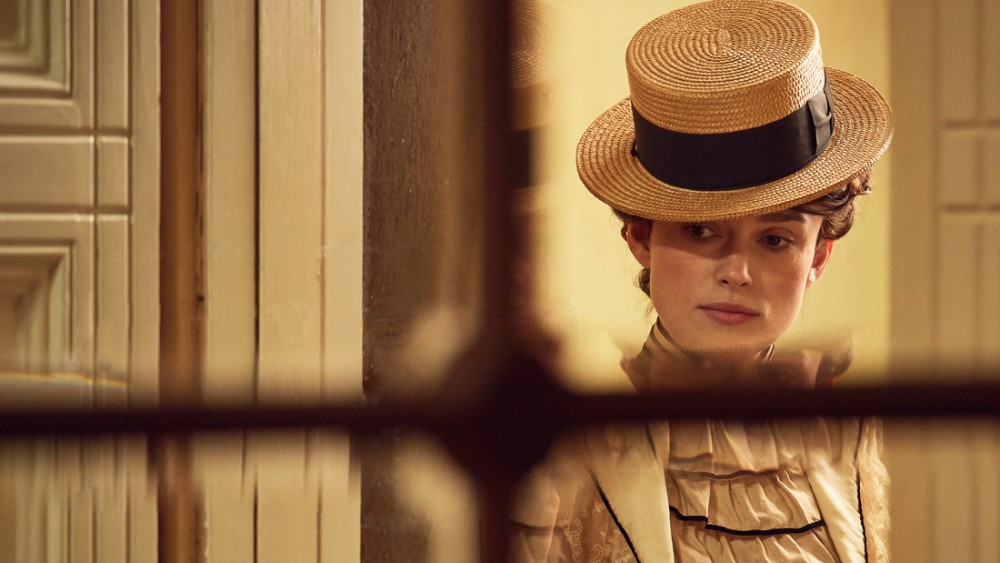Colette
Colette, 2018, 3 ¼ stars
Socially relevant Colette sumptuous but formulaic
From The Orlando Weekly, October 10, 2018
Duality dominated the life of famed French writer Colette. Born a 19th-century country girl with old-world mores, she became the libertine – and liberated – toast of 20th-century Paris. And initially content to stay in her husband’s shadow as she ghost-wrote his novels, she eventually divorced him, claimed authorship for herself and received a Nobel Prize nomination for a body of work that included Gigi and the four Claudine books.
Colette, the new biographical drama from British-American director Wash Westmoreland (Still Alice), shares that duality, as it showcases a cultural and sexual whirlwind in a surprisingly straightforward fashion. It is, therefore, stuck in two universes: one of subject and one of form. That dichotomy is interesting to observe, though the movie is not as successful as its namesake at juggling its two worlds.
Colette the woman was groundbreaking and talented, but Colette the movie, while gorgeous, isn’t particularly original or poetic. While Keira Knightley, in the title role, again proves why she’s one of the greatest actors of her generation, she lacks chemistry with Dominic West (Willy, her husband), and their quarreling grows tiresome. Admittedly, it’s fascinating to see the modern world come into its own, with the newly invented lightbulbs providing a nice metaphor for a cultural and sexual illumination. But the film never shines with the same intensity as the new incandescence. It’s gaslight in electric ladyland.
“The hand that holds the pen writes history,” Colette and her husband agreed when she started secretly writing his books.
But when the dust settled on their marriage, it was Colette clutching the quill, reducing her husband to the dust bin of history. Yet the screenplay – by Westmoreland, Ricard Glatzer and Rebecca Lenkiewicz – never paints Willy as a villain intent on subjugating his wife, and that’s a mature decision. Rather, he’s just a man: complicated, flawed, proud and ultimately unable to manage his jealousy and financial affairs. Still, when he’s described late in the film as broken, one is left wondering exactly where and when he broke, because the choppy script never fully depicts that break.
Instead, the film is more concerned with presenting chronological glimpses of Colette’s psychological and cultural transformation. “Look at that,” it’s saying. “Here, let me show you this,” and “Ah, isn’t this socially relevant to today’s gender-equality and transgender-rights battles?” The answer to that question is yes, but the lesson lacks both the profundity and subtlety of a more accomplished writer and director.
Colette is the second major release this year to focus on a woman who ghost-wrote her husband’s books. The other – spoiler alert! – is The Wife, starring Glenn Close and Jonathan Pryce. But in that film, we must wait to find out the true author, and therein lies the suspense. Because Colette plays its narrative cards face up, the suspense lies not in the audience reveal but in the reveal to the French public. But that reveal is reduced to explanatory text in the end credits, robbing us of what must have been not just a revelation to the literary world but a moment of catharsis for Colette. Still, it’s engrossing to watch Knightley guard that secret while simultaneously exploring her intellectuality and sexuality with her sultry American lover (Eleanor Tomlinson), her “lady-man friend” (Denise Gough) and the famous singer-actress-tightlacer Polaire (Aiysha Hart).
Colette succeeds, despite its flaws, because of Knightley’s powerhouse performance, Michael Carlin’s sumptuous production design and Giles Nuttgen’s sensual cinematography. (The latter births arguably the most erotic cinematic experience of 2018.) Without those three factors, Colette would have sunk into mediocrity, unworthy of its unique subject. As it stands, it’s a worthwhile flirtation with an alluring and influential historical period.
© 2018 Orlando Weekly / MeierMovies, LLC
